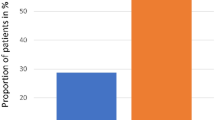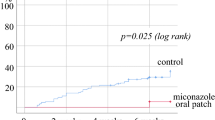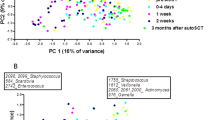Abstract
Oral mucositis is a dose-limiting toxicity of intensive chemotherapy. It is caused directly by the cytotoxic effect of chemotherapeutic agents and indirectly by sustained neutropenia. Severe oral mucositis is an important predisposing factor for life-threatening septic complications during aplasia. It also reduces quality of life. At present, no effective causal prophylaxis or treatment against oral mucositis is established. We performed a prospective randomised placebo-controlled trial using topical oral r-metHuG-CSF (filgrastim) in high-grade lymphoma patients treated according to the B-NHL protocol, which contains high-dose methotrexate and causes severe oral mucositis (WHO grades I–IV) in >50% of patients. Between August 1996 and July 1997, a total of 32 chemotherapy cycles were documented in eight patients (four male, four female). Mucosal erythema and ulceration were recorded. All patients assessed their oral pain and impact on swallowing daily, using a subjective scale from no to maximal discomfort (1–10). In addition, oral mucositis was assessed according to the WHO score. Filgrastim was administered in 16 cycles as a viscous mouthrinse (carboxymethyl- cellulose 2%, oleum citrii) 4 × 120 μg/day from days 10 to 16. Sixteen cycles were given to control patients, of these 14 with placebo, and another two cycles with no treatment. Severe mucositis (WHO grade III/IV) was documented in 21 of 32 cycles (65.5%). A difference of borderline significance was observed for the reduction of maximum severity of oral mucositis between G-CSF vs placebo (P = 0.058), with a reduction of WHO grade IV of 50% (four G-CSF vs eight control). The number of days in hospital was reduced significantly in the G-CSF group (P = 0.02). In conclusion, topical oral G-CSF mouthrinses may be beneficial to reduce oral mucositis.
This is a preview of subscription content, access via your institution
Access options
Subscribe to this journal
Receive 12 print issues and online access
$259.00 per year
only $21.58 per issue
Buy this article
- Purchase on Springer Link
- Instant access to full article PDF
Prices may be subject to local taxes which are calculated during checkout
Similar content being viewed by others
Author information
Authors and Affiliations
Rights and permissions
About this article
Cite this article
Karthaus, M., Rosenthal, C., Huebner, G. et al. Effect of topical oral G-CSF on oral mucositis: a randomised placebo-controlled trial. Bone Marrow Transplant 22, 781–785 (1998). https://doi.org/10.1038/sj.bmt.1701434
Received:
Accepted:
Published:
Issue Date:
DOI: https://doi.org/10.1038/sj.bmt.1701434
Keywords
This article is cited by
-
Taste alterations in patients with breast cancer following chemotherapy: a cohort study
Breast Cancer (2020)
-
Systematic review of growth factors and cytokines for the management of oral mucositis in cancer patients and clinical practice guidelines
Supportive Care in Cancer (2020)
-
Topische Schmerztherapie bei oraler Mukositis
Der Schmerz (2013)
-
Systematic review of cytokines and growth factors for the management of oral mucositis in cancer patients
Supportive Care in Cancer (2013)
-
Serum amyloid P ameliorates radiation-induced oral mucositis and fibrosis
Fibrogenesis & Tissue Repair (2010)



